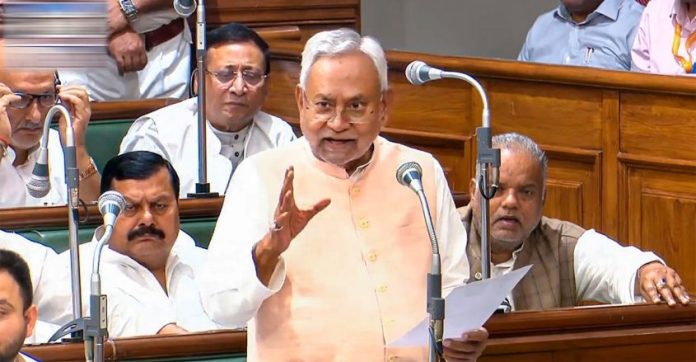Bihar state assembly has unanimously passed a Bill to increase reservation for marginalised castes to 65%

By Abhay Kumar
The Bihar state assembly has unanimously passed a bill to increase the reservation for the marginalised castes to 65%. The 65% reservation has been proposed in educational centres and government jobs. The direct beneficiaries of the quota hike will be the historically marginalised castes and tribes such as Scheduled Castes (SCs), Scheduled Tribes (STs), Extremely Backward Classes (EBCs) and Backward Classes (BCs).
According to media reports, the EBCs will get 25%, while at present they receive 12% reservation. The proposed hike has been justified based on a caste survey in which the population of the EBCs has been estimated at 36%. Similarly, the shares of BCs, SCs, and STs are estimated at 27%, 20% and 2% respectively. If the Bill is implemented, the SCs will get 20% reservation, while they at present get a mere 14%. STs, on the other hand, will get a 2% reservation. That is why the reservation for the marginalised castes has been increased to make it more proportional.
Chief Minister Nitish Kumar and Deputy Chief Minister Tejashwi Yadav deserve appreciation for taking such a bold decision to boost the politics of social justice. The opposition BJP, which is otherwise against Mandal politics, has been forced to support the Bill for fear that any opposition to it may further expose the saffron party as the one led by upper castes.
The Bill was brought to the assembly after the state government conducted a caste survey. The full report of the caste survey is yet to be accessed by the author, but the media reports suggest that the survey clearly shows the underrepresentation of the historically marginalised castes and tribes in public sector jobs. The decision to increase the quota to 65% for the marginalised community has been taken by the Bihar Government to democratise society and give the subaltern their dues.
Political experts believe that if Nitish and Tejashwi can implement the quota hike and give benefits to the marginalised castes, the politics in Bihar may shift further towards social justice and it will give a big jolt to the politics of communal polarisation.
Although the Bill has been passed by the state house, there are many more hurdles in its path. For example, it has to go through multiple procedures and get approval from higher authorities before it can be put in place. It is feared that the Bill might be challenged in the court by the upper caste lobby. The mainstream media, which is largely dominated by the upper castes, might do everything to portray the Bill as “divisive” and “anti-upper castes”.
Given these ground realities, the social justice parties still need to do a lot more. Not to talk of the forces outside, even the upper castes lobby within their party would try to sabotage the social justice agenda and discredit the committed leadership. But if Nitish and Tejashwi-led Bihar government achieves the target, they will make history.
But whatever has happened in Bihar, it can safely be said that the social justice parties in the state are playing an important role in showing the way for the confused opposition parties across the country.
The biggest problems with the opposition parties are ideological.
With the rise of Hindutva politics, a sizable section of the opposition leaders started doubting their secular politics. They went on to play a soft Hindutva card in the hope that it would see their parties win elections. This is one of the reasons why they almost stopped uttering the names of Muslims and their issues.
Besides, they tended to ignore caste-based inequality and shun secular idioms. Instead of raising the issues of inequality, they began to speak in religious terms and turned ultra-nationalist. But the Janta Dal (United) and Rashtriya Janata Dal (RJD) have reaffirmed their faith in the politics of Mandal and forced even the champion of Kamandal politics to follow suit.
With the hike in the reservation for the marginalised castes, the effective reservation has gone up to 75%. This includes a 10% reservation for the Economically Weaker Section (EWS). The Bihar Government appears to have made it clear that it would not touch EWS reservation and that it would continue as usual. Speaking to The Indian Express (November 10), the state finance minister Vijay Kumar Choudhary said that “the Bill shows our committeemen towards inclusive growth”.
Choudhary is seen close to Chief Minister Nitish Kumar. His statement assumes significance in the sense that the JD(U) cannot take the risk of annoying the upper castes. That is why it has spoken in favour of continuing with the EWS reservation.
Please remember that the 10% EWS reservation is given to the poor among the upper castes but several experts on constitutional matters argue that poverty cannot be the ground for extending reservation to any caste or community. Instead of the poverty or economic criterion, the Constitution talks of social and educational backwardness for giving reservations. But the Nitish-led Bihar government appear hesitant to touch these aspects for fear that it may jeopardise the larger goal. This in turn also reflects the dominance of the upper caste politics.
However, the supporters of social justice believe that the JD(U) and the RJD should not feel constrained. While they welcome the decision of the Bihar government to increase the quota for the marginalised castes, they also request the social justice parties to launch a campaign against “the unconstitutional” EWS reservation. It is because the poor people are not exclusive to the upper castes. The SCs, STs, OBCs and the minority community have more poor people than the upper castes have.
Apart from this, the true politics of social justice should also try to achieve proportional and effective representation, as Babasaheb Ambedkar said in his book States and Minorities. That is why the supporters of social justice argue that if the population of the marginalised communities is around 85%, justice demands that they should have a much bigger proportion of the seats reserved for them than what has been passed by the Bihar assembly house.




